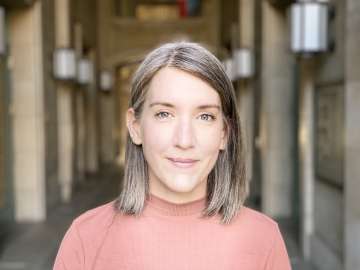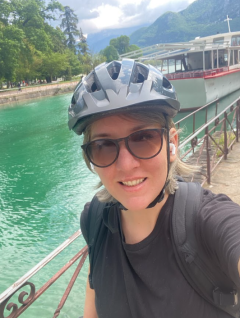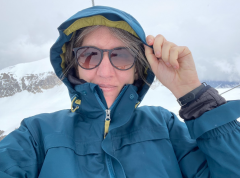Neurology Pathways: Kimberly Paul, Ph.D.
Assistant Professor-in-Residence, Department of Neurology
Dr. Paul's Pathway:

Where were you born and raised? What is your favorite part of your hometown?
Claremont, CA, a suburb of Los Angeles at the foothills of the San Gabriel Mountains. Access to the outdoors and hiking trails all over the Angeles National Forest was definitely my favorite part.
What is your current research focus in epidemiology and Parkinson's Disease?

What motivates you in your work in the neurology department?
What are some influential moments in your career journey? How did these help you get to where you are today?
While there are so many, three come to mind that really influenced my career trajectory, starting back in high school with an amazing science teacher who really helped establish that scientific drive, to my dad casually suggesting epidemiology as a research career path at a time when I didn't even know what an epidemiologist was, culminating in reaching out to who would become my PhD advisor and coming to UCLA specifically to work with her. Each one of these really helped me establish the direction I wanted to head.

What advice would you give to someone interested in merging two areas of research, as you do with epidemiology and neurology?
Mentorship. Mentorship is so important in research and finding committed mentors to help guide you through the cross-training will really help facilitate the journey. During my PhD, I did formal cross-training in epidemiology and human genetics, with mentors from both departments who researched neurodegenerative diseases, which was so helpful.
What is your favorite part of working at UCLA?
I love the supportive environment in the department and the open, collaborative atmosphere. There are so many people with different expertise regarding the same diseases, which really fosters unique perspectives and collaborations. Beyond that, there are numerous opportunities to hear about cutting-edge research every week, including our grand rounds, which provides a really stimulating research environment.

How do you spend your time outside of work? What is your favorite hobby?
I love to get outside. Biking has been a favorite since college. I also love to hike or even just take walks. But recently I've been spending a lot of my free time with my new niece.
What is a professional goal that you are working towards now?
We're in the final year of a research grant looking at cross-tissue methylation and metabolomic measurements within Parkinson's patients and very focused on completing these projects.